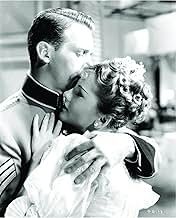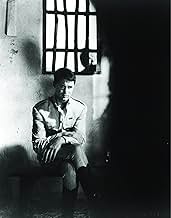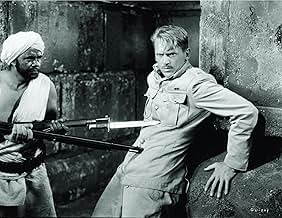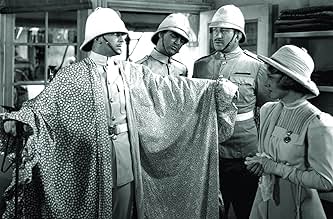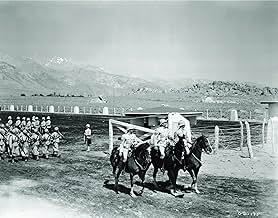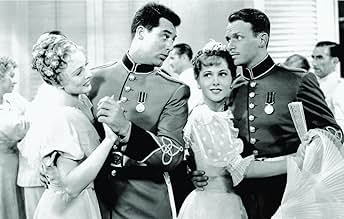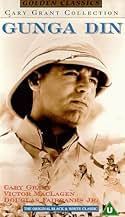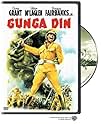Gunga Din
- 1939
- Tous publics
- 1h 57min
NOTE IMDb
7,2/10
13 k
MA NOTE
En Inde, au XIXe siècle, trois soldats britanniques et un porteur d'eau indigène doivent empêcher une renaissance massive et secrète du culte meurtrier des Thuggee avant qu'il ne puisse se r... Tout lireEn Inde, au XIXe siècle, trois soldats britanniques et un porteur d'eau indigène doivent empêcher une renaissance massive et secrète du culte meurtrier des Thuggee avant qu'il ne puisse se répandre dans tout le pays.En Inde, au XIXe siècle, trois soldats britanniques et un porteur d'eau indigène doivent empêcher une renaissance massive et secrète du culte meurtrier des Thuggee avant qu'il ne puisse se répandre dans tout le pays.
- Récompenses
- 1 victoire au total
Charles Bennett
- Telegraph Operator
- (non crédité)
Gene Coogan
- Lancer
- (non crédité)
Jimmy Dime
- Thug
- (non crédité)
George Du Count
- Pandu Lal
- (non crédité)
Anna May the Elephant
- Elephant
- (non crédité)
Histoire
Le saviez-vous
- AnecdotesThe gong in the title sequence is the same one used to summon King Kong six years earlier.
- GaffesBallantine and MacChesney are bound and gagged when the last Thuggee is about to behead them after Gunga Din sounds the alarm. Cutter shoots the Thuggee and Ballantine and MacChesney are unbound as they rush to Cutter's side.
- Crédits fousThe credits appear on a gong. Standing next to the gong is a Hindu man, and every time he strikes the gong, the credits change.
- Versions alternativesGerman theatrical version was cut by approx. 12 minutes. This version was later shown on TV but never released on any home media format. Only in 2018 the film was released on DVD, with approx. 4 minutes restored.
- ConnexionsFeatured in Les corps sauvages (1959)
Commentaire à la une
While it is fashionable in too many circles to condemn anything which portrays European colonialism generally, and the British Empire specifically, in a favorable light, a little historical knowledge will show that Kipling's story, as well as this superb film, are hardly the reactionary racist screed some would like to demote them to. Gunga Din is a regimental bhisti - a water carrier - and in 19th century India that meant that he had a job which guaranteed a place to sleep and food in a very brutal society. Considering that he was also an "untouchable" - a member of India's lowest caste - this was something. Colonel Weed is correct in saying "he had no official status as a soldier" - bhistis were non-military auxiliaries. As for his loyalty to the British, there were many Indians who clearly preferred British rule to that of their fellows - and not just the maharajas and princes.
If you read the story - and watch the movie with an objective eye - at the end, all the major characters have nothing but respect for Gunga Din. Sergeant MacChesney (Victor McLaglen) is clearly shamed by the fact that Din, in the end, was not only the better soldier but the better man - he sacrificed himself to prevent the ambush and massacre of the British column. The most telling example that the movie doesn't "put down" Gunga Din is at the end when Colonel Weed posthumously appoints the former regimental bhisti as a Corporal in the regiment. Corporal was a BRITISH rank - the equivalent Indian rank was Havildar. So, he was appointed as a BRITISH non-commissioned officer who could command British troops - hardly an example of political incorrectness.
Yes, this is "men-as-buddies" flick. However, this movie has a special appeal to anyone who has actually served in the military - those are the types of friendships you make (you'll share your last drop of water with your mess mate) and keep for the rest of your days. It acknowledges that. So enjoy it - it is a rousing tale - and keep the PC-nonsense out of it. The bad guys lose in the end while the best man is recognized for his virtues - you don't even get that it in real life.
If you read the story - and watch the movie with an objective eye - at the end, all the major characters have nothing but respect for Gunga Din. Sergeant MacChesney (Victor McLaglen) is clearly shamed by the fact that Din, in the end, was not only the better soldier but the better man - he sacrificed himself to prevent the ambush and massacre of the British column. The most telling example that the movie doesn't "put down" Gunga Din is at the end when Colonel Weed posthumously appoints the former regimental bhisti as a Corporal in the regiment. Corporal was a BRITISH rank - the equivalent Indian rank was Havildar. So, he was appointed as a BRITISH non-commissioned officer who could command British troops - hardly an example of political incorrectness.
Yes, this is "men-as-buddies" flick. However, this movie has a special appeal to anyone who has actually served in the military - those are the types of friendships you make (you'll share your last drop of water with your mess mate) and keep for the rest of your days. It acknowledges that. So enjoy it - it is a rousing tale - and keep the PC-nonsense out of it. The bad guys lose in the end while the best man is recognized for his virtues - you don't even get that it in real life.
Meilleurs choix
Connectez-vous pour évaluer et suivre la liste de favoris afin de recevoir des recommandations personnalisées
- How long is Gunga Din?Alimenté par Alexa
Détails
- Date de sortie
- Pays d’origine
- Langue
- Aussi connu sous le nom de
- Aufstand in Sidi Hakim
- Lieux de tournage
- Société de production
- Voir plus de crédits d'entreprise sur IMDbPro
Box-office
- Budget
- 1 910 000 $US (estimé)
- Durée1 heure 57 minutes
- Couleur
- Rapport de forme
- 1.37 : 1
Contribuer à cette page
Suggérer une modification ou ajouter du contenu manquant



